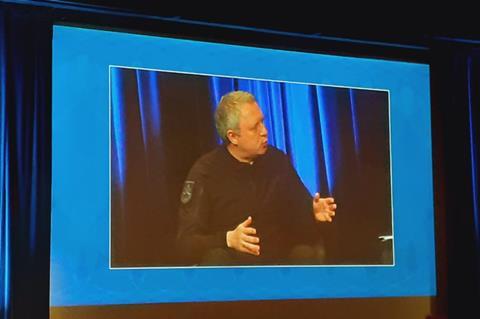Ukrainian prosecutors are continuing to build a full ‘evidentiary base’ for charging Russia with the crime of genocide, Ukraine’s prosecutor general Andriy Kostin told the International Bar Association in Paris on Monday.
‘First of all, we have a group of prosecutors who are specialised in the investigation and prosecution of these crimes,’ Kostin told a packed lunchtime event. ‘We won a court case against a Russian propagandist publicly calling for the killing of Ukrainian children. But this is only the beginning. We all understand that in order to have a strong case at an international level, we need first to be open in order not to limit ourselves to the two previous cases of genocide which ended in conviction [Rwanda and Srebrenica].’
He added: ‘We have no right to lose this case - therefore, our evidentiary base should be stronger than we believe it should be.’
Ukraine is not a signatory to the Rome statute, which established the International Criminal Court. Russia has been accused of crimes against humanity in Ukraine and an arrest warrant issued for President Vladimir Putin. But neither country is a member of the ICC and there are limits on how the court can proceed.

Kostin supports the ICC and believes his country will sign up. But Ukraine seeks the creation of a special tribunal to pursue ‘the troika’ – Russia’s head of state, head of government and foreign minister - in order to pierce their status-based immunity under international law for the crime of aggression.
’[This tribunal] should have jurisdiction over Putin and other members of the Troika, and it should be of an international dimension,’ said Kostin. ‘Because the crime of aggression is not only a crime according to Ukrainian law, [but also] an international crime. In order to prosecute and to punish those who started this war of aggression and are pursuing it, the response should be international. In this respect not only will Ukrainian victims of this war receive justice, it will also have a deterrent effect. Not every potential aggressor now in the world is the member of Rome statute.’
The packed lunchtime event also heard an emotionally charged exchange between Kostyn and Amit Becher, head of Israel’s bar association. In the Q&A, Becher asked Kostin how he deals with those suspected of atrocities in accordance with the rule of law - ‘which you should’ – but in circumstances where, ‘on the other hand, the public cannot understand how such horrific actions’ are handled.
Becher added: ‘We lawyers know we need to have due process and representation, but how do you feel about the conflict between the – quote, unquote – “normal procedures” against abnormal, unthinkable, inhuman actions, when [only] as a prosecutor can you fully understand the horrible situation that occurred?’
‘Thank you for this question. Very important,’ Kostin replied. ‘I think the answer is very simple. They want to dehumanise us. The same crimes were committed against Ukrainians. They want to dehumanise but we are human beings. We cannot come down to their level.’
Becher responded: 'Thank you for those words, they are important. I want everyone to help us bring the 230 [Hamas] hostages including women and children home. It’s a human call. I know that you empathise with that.'
Kostin replied: ‘We fully understand your situation. We are investigating a case of the forced deportation of 19,000 Ukrainian children. We have thousands of civilian hostages who are illegally detained in Russia and occupied territories. We are calling for the creation of an international mechanism on how to bring children and civilian hostages back home because, for them, there are once again gaps in international law, humanitarian and criminal.
'The role of lawyers in this is crucial. When I’m talking with politicians, all of them support the need to return to children back home, the need to release all civilian hostages. But [they] don’t know what to do or how to do it. It’s our obligation as lawyers to help politicians create [these] mechanisms.'
Topics
IBA 2023: Ukraine seeking watertight 'evidentiary base' for genocide charge

‘They want to dehumanise us’: conference also hears emotionally charged exchange between Ukraine’s chief prosecutor and the head of Israel’s bar on dealing with alleged perpetrators of atrocities.
 Currently
reading
Currently
reading
IBA 2023: Ukraine seeking watertight 'evidentiary base' for genocide charge
- 2
- 3
- 4
- 5
- 6
- 7












































No comments yet